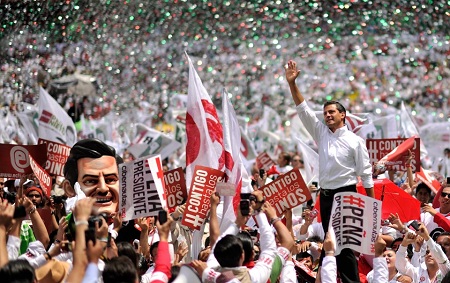The presidential race’s outcome may seem all but certain, but the race for Los Pinos has nonetheless received much more coverage than the legislative elections that take place on July 1 as well — and are just as vital to the comeback hopes for the Partido Revolucionario Institucional (PRI).![]()
In addition to electing a president, Mexicans will elect 500 members to the lower chamber, the Cámara de Diputados, and 128 members to the upper chamber, the Senado.
If polls are accurate, not only will the PRI’s presidential candidate, Enrique Peña Nieto, win, but it will also win an absolute majority in the Cámara de Diputados — the first time that a party has won an absolute majority since electoral reforms in 1996, which would give Peña Nieto the best environment in over 15 years to pass legislation in Mexico. A Mitofsky poll released yesterday shows that the PRI and its allies would win 44% of the Congressional vote to 29% for the PRD and its allies and 24.5% for the PAN.
Although the conservative Partido Acción Nacional (PAN) has controlled the presidency since 2000, first under Vicente Fox and then under Mexico’s incumbent president, Felipe Calderón, it never controlled an absolute majority of seats in the Cámara de Diputados and only from 2000-03 and from 2006-09 did it even hold the largest share of seats. Given that dynamic, the PRI and the leftist Partido de la Revolución Democrática (PRD) have been able to unite in opposition to the PAN, frustrating the extent of Fox and Calderón to enact major reforms (although Calderón has passed minor tax reforms in 2005 and energy reforms in 2008).
Under the current rules, 300 deputies are elected on the basis of first-past-the-post plurality in single-member districts. An additional 200 deputies are elected by proportional representation — each party that wins 2% is entitled to its share of seats.
No party, however, can win more than 300 seats in total — 200 seats must always be apportioned to opposition parties. As most reforms in Mexico are “constitutional reforms” requiring a 2/3 supermajority, most major initiatives therefore require a broad base of support. While that is of some assurance to those who are worried about the PRI’s authoritarian roots — Peña Nieto and the PRI won’t likely be able to push through legislation that would repress the gains of Mexican democracy — it also is the primary reason that Fox and Calderón have not accomplished any truly landmark legislative victories in the past 12 years. Continue reading The PRI also looks likely to sweep Mexico’s congressional elections on July 1

